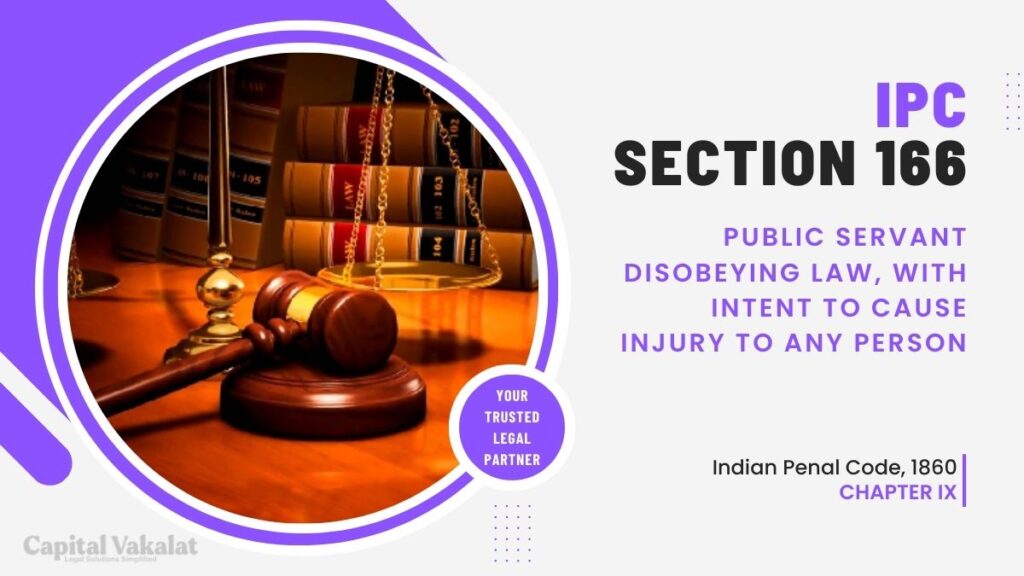Public service is a noble profession that comes with a significant responsibility to uphold the law and serve the community with integrity. Section 166 of the Indian Penal Code (IPC) deals with the offense of a public servant disobeying the law with the intent to cause injury to any person.

In this article, we will explore the intricacies of this legal provision, its implications, and the importance of ensuring compliance within the public service sector.
Understanding Section 166 IPC
Section 166 of the IPC focuses on the conduct of public servants. It states that a public servant is legally bound to obey the law in the course of their duties. Failure to do so, with the intention to cause injury to any person, constitutes an offense under this section. The law demands public servants to act responsibly, fairly, and without prejudice.
Key Elements of Section 166 IPC
To better understand this section, let’s break down its key elements:
Intent to Cause Injury
For an offense to be established under Section 166 IPC, the public servant must have a clear intent to cause injury. This requirement emphasizes the seriousness of the violation and ensures that individuals are held accountable for their actions.
Acts Constituting Disobedience of Law
This section encompasses various acts, such as willful neglect of duty, deliberate misuse of power, and knowingly violating legal provisions. Any such acts that lead to injury are deemed unlawful.
Punishments Under Section 166 IPC
The penalties for contravening this section can be severe. Offenders may face imprisonment, fines, or both, depending on the gravity of the offense. These punishments are designed to deter public servants from flouting the law and causing harm.
Importance of Upholding the Law
Upholding the law is crucial for maintaining the public’s trust in government institutions. Public servants play a pivotal role in society, and their actions must be consistent with legal and ethical standards to ensure the well-being of the people they serve.
Consequences of Disobeying the Law
When public servants disobey the law and cause injury, it can have severe consequences, not only for the victim but also for the public servant and the institution they represent. This can erode public trust, lead to legal actions, and tarnish one’s career.
Cases Illustrating Section 166 IPC
Several notable cases in India have highlighted the significance of Section 166 IPC. These cases serve as reminders of the legal and moral obligations that public servants must adhere to in the course of their duties.
Legal Defenses
Public servants accused of violating Section 166 IPC can mount various legal defenses. They may argue that they acted in good faith or that there was no intent to cause harm. The court carefully examines such defenses to determine their validity.
Reforms and Amendments
Over time, Section 166 IPC has undergone amendments to adapt to the evolving legal landscape and address new challenges. These changes are aimed at ensuring better enforcement and accountability within the public service sector.
Significance in Public Service
Section 166 IPC plays a critical role in upholding the principles of accountability, fairness, and justice in public service. It acts as a deterrent against abuse of power and serves to protect the rights and interests of citizens.
Ensuring Accountability
To prevent the disobedience of the law by public servants, it is essential to establish effective mechanisms for accountability, including regular training, transparent procedures, and oversight bodies.
Conclusion
In conclusion, Section 166 IPC is a vital legal provision that holds public servants accountable for their actions and decisions. It emphasizes the importance of acting in the best interests of the public and upholding the law. By adhering to these principles, public servants can contribute to a just and equitable society.
Frequently Asked Questions
Can a public servant be punished under this section without clear evidence of intent to cause injury?
No, intent to cause injury is a crucial element in establishing an offense under Section 166 IPC.
Are there any recent amendments to Section 166 IPC?
The section has seen amendments to address contemporary issues and challenges within the public service sector.
How does Section 166 IPC contribute to public trust in government institutions?
By holding public servants accountable, it ensures that they act in the public’s best interests, thereby maintaining trust.
What legal defenses can public servants use when accused under this section?
Public servants may use defenses such as acting in good faith or proving that there was no intent to cause harm. The court examines these defenses closely.